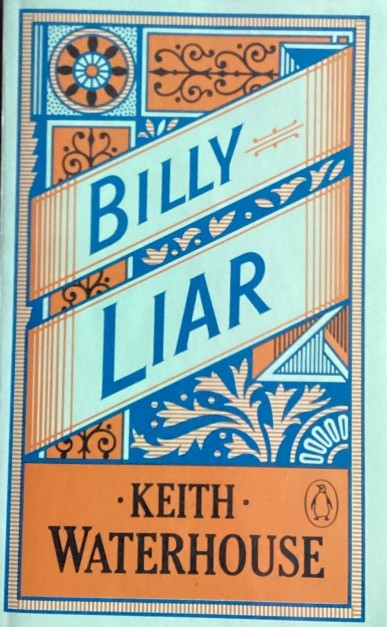Inspiring Older Readers
 posted on 03 Oct 2022
posted on 03 Oct 2022
Billy Liar by Keith Waterhouse
Keith Waterhouse (1929 - 2009) was, in many ways, the archetypal tabloid journalist from the heady days of Fleet Street in the 60s & 70s - working class, opinionated, iconoclastic and, stereotypically, hard drinking. In his obituary for Waterhouse published in The Guardian in 2009, Mike Molloy put it this way:
“All his life, Waterhouse was a heavy drinker (which is not the same as being an alcoholic). No matter how riotous the night before had been, each morning he was at the typewriter. He often claimed that God had blessed him with the gift of the delayed hangover, one that kicked in only when he had done his day's work. Once a heavy smoker, he quit, but loathed non-smoking fanatics.”
But Waterhouse was considerably more than just another Harry Hardnose - he proved himself a more than skilful novelist and took up scriptwriting with gusto and adapted significant works of contemporary literature for the stage and television. It was one of his novels, Billy Liar, that made him famous and achieved the formidable trick of being a significant literary success as well as a popular best seller. The stage version of the book was rushed out quickly with Albert Finney in the lead but it was his adaptation (with Willis Hall) for the film starring Tom Courtney that became the classic, definitive embodiment of Waterhouse’s bitter-sweet story.
Billy Fisher is nineteen, lives in the (imaginary) dead-end Yorkshire town of Stradhaughton and works as a clerk in the local undertakers. But the tedious reality of his job and family life isn’t enough to satisfy Billy’s compulsive urge to discover his true vocation as a comedy script writer for a London-based minor celebrity personality. Billy copes with life by living in different states of reality, in worlds he has created for himself and into which he can escape. Inside his head he can take himself off to be the ruler of Ambrosia where he is hailed as a returning hero and where he can escape the neurosis and muddle of his real life.
Billy has also got himself into quite a mess with women. He has managed to find himself engaged to two girls he doesn’t like and unable to develop a satisfactory relationship with the one, Liz, who clearly understands him.
At work, things are no better. He hates his employers and spends much of his time developing his comic script material with a colleague in the office rather than doing any work. He seems determined to self-destruct: when given the job of posting the firm’s Christmas calendars he fails to do it (pocketing the postage money for himself) and then struggles to dispose of the evidence. An examination of the books will soon reveal that he’s been systematically fiddling the postage stamp money.
As Billy’s real world begins to implode - his double-dealing with fiancés and stamp money come dramatically to light - it is Liz who counsels him to follow his desires and to go to London to chase his dream. Emboldened, Billy decides the time has come to leave and heads for the train station with the intension of catching the London train there and then. But the book ends with Billy leaving the station and walking home - he will never leave.
Descriptions of the gritty working class reality that Billy is trying to escape from tended to get the book associated with the ‘Angry Young Man’ generation or the Kitchen Sink novels of the 60s but, in truth, it really belongs to neither and, equably possibly, to both. Billy Liar looks into the heart and mind of every teenager at some point in their life - the fantasies may vary but the desire to dissemble and to escape is a universal one. Reviewing the anniversary release of the book in 2009, John Keenan wrote:
“The key to the success of the novel is its vivid characterisation. Billy's frenetic mother, irascible father and disappointed girlfriends may be types – but they are types all of us know. No one escapes Billy's jaundiced eye: from his Gran, a "dress fanatic who always seemed to be fully attired even at two in the morning when she slunk down stairs after the soda water" to his boss Shadrack the undertaker, carrying a matchbox-sized Perspex model of a coffin in his blazer pocket which, he assures an indifferent Billy, will be the next big thing in burials. The only bright spot in Billy's life is the free-spirited Liz whose presence is a comforting refuge from his tormentors.
Billy Liar promoted no political agenda which, perhaps, is why it reads so well today. Billy is an Everyman, forever seeking to dodge responsibility, outwit the forces of mediocrity and to live in a world where he is always the winner. We are all, at times, a bit like Billy…”
Paperback copies of the book are readily and cheaply available in a range of different editions but the first edition hardback is surprisingly expensive.
Terry Potter
September 2022